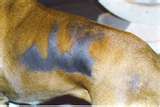Balding in Dogs
Allergic reactions are not the only potential causes
Balding in dogs is much different than shedding and there are several diseases that can cause bald spots.
However, there are also several factors that can affect hair growth in your dog.
Different breeds of dogs will be affected in varying degrees of balding with both allergic reactions and nutritional deficiencies as the major causes.
HORMONES MAY BE A FACTOR
Allergic reactions to food or air bore irritants are a major cause of this condition or hot spots; but there is also a litany of other factors that most owners are not aware of including some of the following.
Hormones are often associated with stimulating hair growth in dogs, but what is not well known is that some hormones will affect and or even retard hair growth, causing balding in dogs.
They are also chemical messengers that are made in one part of your dog’s body and then sent to other parts of the body to help build cells and tissues.
Testosterone, estrogen, melatonin, thyroxin, as well as cortisol all affect your dog’s hair growth.
However, the two most influential hormones that can build or retard hair growth are thyroxin and cortisol.
 Nutrition is extremely important
Nutrition is extremely importantYour dog’s thyroid gland that is located in their neck manufactures thyroxin and this hormone travels to every cell in their body.
Its role is than to stimulate these cells to encourage growth.
When these thyroxin levels are normal, your dog’s hair is thick and shiny.
If it is insufficient due to hypothyroidism, hair growth will become very thin and begin to bald as it progresses.
Cortisol is a hormone that is released from the adrenal glands in your dog and is carried by their blood to most of their cells.
If the level of cortisol is too high as the result of too much cortisol medication or Cushings disease, your dog’s hair will start to thin, especially on and around the tail.
If the hair on your dog is clipped anywhere on their body during this overload, the hair will grow back but the growth will be very slow and there may be several bald spots.
If the levels of this hormone are too low as a result of Addisons disease, your pet has a bigger problem than just balding as they will have a massive hair loss.
NUTRITION PLAYS A MAJOR ROLE IN BALDING IN DOGS
Your dog’s hair needs a constant supply of nutrients to remain anchored in the skin.
If your dog does not get this constant supply of nutrients such as Omega 3 and Omega 6 fatty acids, their hair follicles will become loose, dull, and start to fall out causing bald spots.
The B grouping of vitamins is extremely important to your dog in preventing balding in dogs.
Inositol is a member of the B group of vitamins and referred to as Vitamin B8. It is a compound that is found in your dog’s brain, muscles, liver and their eyes.
Tests have proven that if your pet’s diet lacks this vitamin it produces baldness, but once the vitamin was reintroduced, the hair grew back very quickly.
The tests also showed that male dogs need this vitamin much more than females and a deficiency can also cause eczema, a skin irritation that can also cause balding in dogs.
Biotin, another B vitamin, has also proven to increase hair growth in dogs and is essential in preventing hair loss and balding.
This vitamin also helps to metabolize fatty acids that are valuable in maintaining hair coats as well s preventing premature graying in dogs.
Zinc deficiency also causes balding as well as changing the structure of your dog’s hair coats making it much more course.
As a result, it can lead to massive hair losses.
Zinc deficiency in dogs can be caused by a dietary deficiency or by stress.
However, perhaps the most important B vitamin in preventing baldness in dogs is Pantothenic acid as it is required to active copper in your pet.
Copper deficiency is perhaps the single largest reason balding in dogs.
THE ROLE OF COPPER
Copper helps to strengthen hair as it stimulates hair follicles to produce healthier hair as well as strengthening critical collagen bundles in the skin.
These bundles are critical for healthy hair growth and keeping it in place.
Copper is also essential in increasing the size of hair follicles by supplying them with an ample source of blood.
Protein is also very important for dogs for several reasons and preventing baldness is one of them.
Methionine, a sulfur containing amino acid found in protein, is required by your dog for normal hair growth.
Protein calorie malnutrition not only produces balding in dogs but it also causes dry, brittle and sparse hair coats.
There is also one other helpful tip in preventing balding in your dog. Hair loss and balding is often the result of poor metabolism.
A few teaspoons of apple cider vinegar added to your dog’s food can increase the metabolism very rapidly and prevent balding in dogs.
Mineral salt deficiency is one of the major causes of balding and thinning hair, and cider vinegar is extremely rich in mineral salts. .
Summary
Balding in dogs can have several underlying diseases as the cause, but in the majority of the cases it is caused by a hormone imbalance that is almost always triggered by a nutritional deficiency.
The B group of vitamins, zinc, copper, and proteins are critical for your dog and their hair.
Metabolism is also very important and apple cider vinegar triggers this reaction.
It is a very inexpensive and very effective way of protecting against bald spots.
Source of Treatments for Balding in Dogs
Dog Vitamin Store
Dog Skin Health








